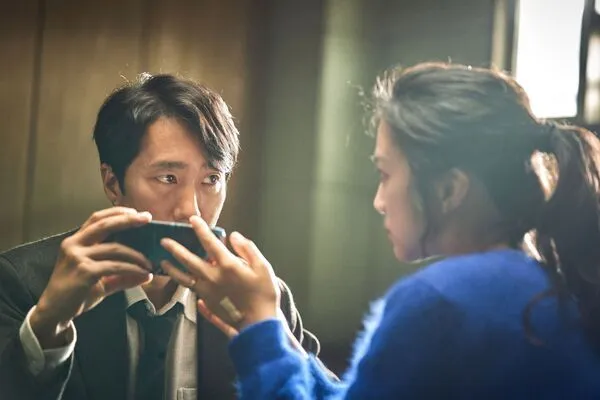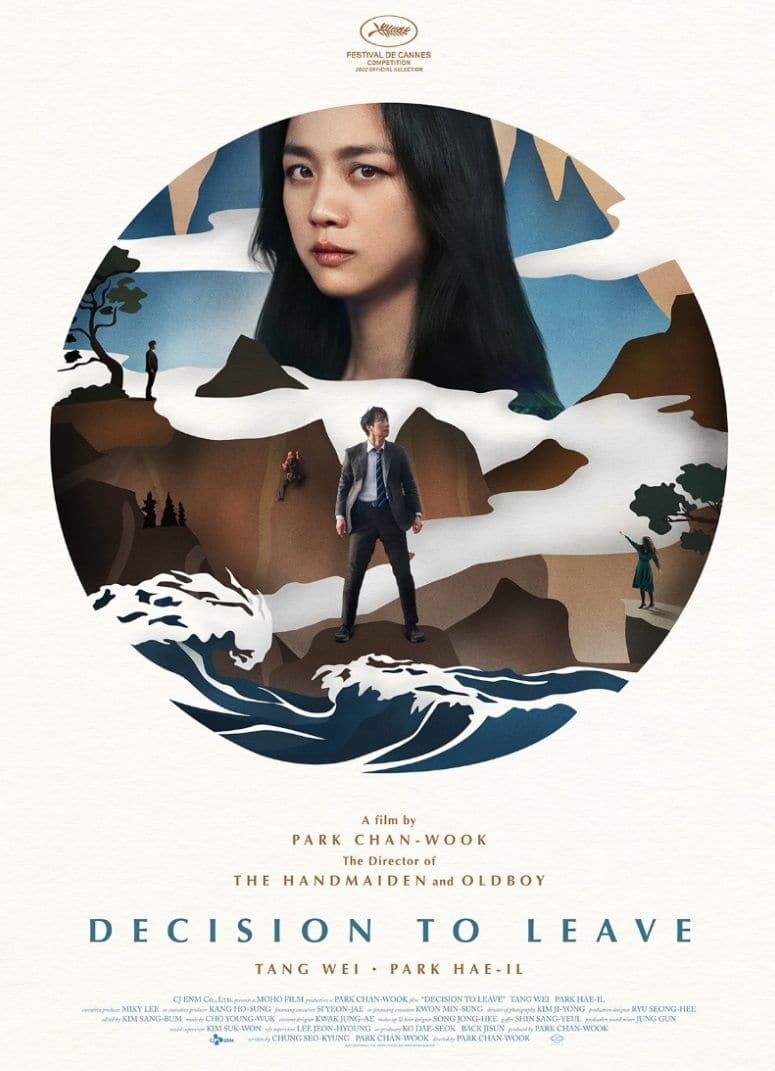Eye For Film >> Movies >> Decision To Leave (2022) Film Review
Decision To Leave
Reviewed by: Jennie Kermode

Police officers have to be prepared to take risks to investigate deaths, but sometimes those risks feel completely unreasonable. Struggling to reach the summit of a rocky outcrop from which a climber fell, Jang Hae-joon’s asks why on earth people do these things. At the summit, the answer becomes clear. The whole city and surrounding area are spread out below like a map. From here one might see anything. Seeing is believing in Park Chan-wook’s haunting tale of complicity and obsession, but it’s not enough. In his apartment, Hae-joon (the always dependable Park Hae-il) has a whole wall covered in pictures from cold cases, the faces of people whose murders he has been unable to solve. Their stories haunt him, and although he has built up a reputation in his department, one gets the sense that he is drifting further and further out of touch with the work he should be doing in the present. He is married and seems to have a happy domestic life, but when another distraction comes his way, that, too, will slide out of his view.
The tale of the detective who falls for a murdered man’s possibly culpable wife is one of the oldest in cinema, but Park makes it fresh with his compelling characters and storytelling style, which is anything but predictable. At the centre of this is perhaps the most intriguing female character to appear in Korean cinema for years. Nothing like the usual stereotype of a desirable woman, Song Seo-rae (Tang Wei) is an unusual looking fortysomething Chinese immigrant with limited Korean language skills and a fiercely assertive personality. Her apparent lack of concern for her dead husband immediately makes the police suspicious, but they can’t find any obvious evidence of her involvement. On stakeout duty, watching her day and night, Hae-joon becomes increasingly obsessed, her evident frustration only deepening his fascination. Soon he’s ignoring orders to cease his surveillance, inspiring concern in his wife , and getting closer to the suspect than is safe for either of them.

There’s a lot of moral ambiguity in this story, Seo-rae’s past holding secrets which make Hae-joon inclined to sympathise with her even if she is guilty, but when the film leaps abruptly into a second chapter, new events make that a lot more difficult. Both central characters behave in ways based much more on what they want to believe than on any objective reality. Both are sharply intelligent, but use their intelligence to justify rather than direct their actions. In interrogation scenes, and sometimes elsewhere, Seo-rae’s linguistic limitations lead to her making statements which might be interpreted as confession, or might just be a result of clumsy speech. Up until her painfully eloquent final words, which call all the rest into question, the same applies with her verbal responses to Hae-joon’s feelings for her. As romance develops between the two, they continue to engage in a species of combat, keeping us guessing as to who will win and what it will cost, right up until the film’s ingenious and devastating ending.
Most cinematic romances tell us what to think, having characters state what they feel early on or inviting us to share lustful gazes. Park does it the hard way, building up a complex psychological and intellectual relationship in which sexual desire feels like an emergent characteristic rather than a starting point. Both characters have got to where they are in life thanks to their powers of endurance and ability to focus exclusively on specific goals. When they focus on one another, the result seems so specific, so intense, as to be incompatible with any other aspect of life. It is also the kind of relationship which can make other people in the vicinity – including the audience – feel shut out, even rejected. The film is often alienating, deliberately uncomfortable, teasing with moments of dazzling beauty, then taking us back into dark, cramped spaces where it becomes literally impossible to see anything beyond their togetherness.
Many viewers will find this a difficult film to engage with. It builds up in waves, the effect almost indiscernible until a rush of emotion breaks the surface. Underneath, there are layers and layers of mystery. Is it worth the effort? Suffice to say that it won’t just help you while away a couple of hours – your mind will keep gnawing away at it for weeks.
Reviewed on: 10 Dec 2022
















